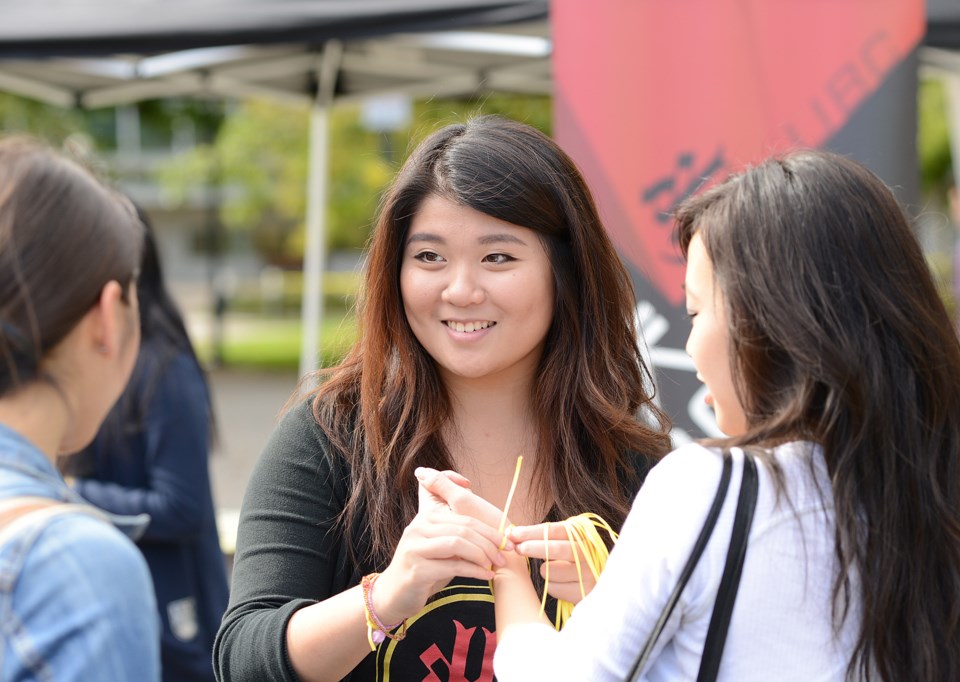As protests for democracy continue in Hong Kong, UBC students from the Chinese special administrative region said they’d be on the streets with their friends if they were at home.
“They’re the next generation,” said economics student Marcella Chow. “They’re going to be affected by it the most. They need to learn what to do if it ever happens again. They need to know what Hong Kong wants as a whole.”
Chow is the public relations director of UBC’s Hong Kong Students’ Association. On Wednesday, the club handed out yellow ribbons for protest supporters to wear and provided a banner for written messages, which will be displayed at their booth by the Student Union Building over the next few days.
The club chose Oct. 1 for their event because it was China’s National Day holiday. The number of protesters on Hong Kong streets grew to express their dissatisfaction during official celebrations. Hong Kong residents are protesting for suffrage in response to China’s announcement that all political candidates have to be preapproved. The protesters believe the promise of autonomy for Hong Kong following the 1997 handover of the former British colony to China is proving illusory.
Patricia Poon, the club’s president, hopes to provide students a chance to learn more about the events overseas and let protesters know they aren’t standing alone.
“It’s for the people of Hong Kong to decide what happens,” said Poon, “but we just want to raise awareness and emphasize our support to Hong Kong students during this time... It’s not up to us to say what’s right or whether democracy is the right choice, we don’t know. We just want to spread global awareness of the democracy issues.”
Chow’s Hong Kong friends hope the public doesn’t view the protest as a battle between students and police. “They’re on the same side,” she said.
“Police are just doing what they’re told, to scatter them off the streets.”
Nick Ng, another student born and raised in Hong Kong, agreed. His friends are also on the streets and said there aren’t daily confrontations between protesters and police. “It’s not as biased as what people think in the media,” said Ng.
Ng wrote “Hong Kong, add fuel” on the banner in Chinese, a popular phrase to encourage hard work.
Science student Jason Zhou stopped by the club’s booth to note that Hong Kong students he spoke to were upset with the increasing number of mainland Chinese over the years who were disrespectful to locals. “These are social and cultural values,” said Zhou. “If people voted for democracy, would these issues vanish overnight?”
Matt Kwan, an English student who arrived in Vancouver from Hong Kong two years ago, is conflicted because he doesn’t think the movement is enough to win democracy. “It’s going to be interesting seeing what the next step is,” he said. “I don’t think the Chinese government is going to change their minds... but it definitely sends a message to the world.”
The club used social media to encourage supporters to wear yellow. Another student group called Global Solidarity decorated lampposts around campus with yellow tape.
UBC’s Goddess of Democracy statue, created during the Tiananmen Square protests of 1989, bore a yellow umbrella, a symbol for the movement as Hong Kong protesters use umbrellas to deflect tear gas and pepper spray. This and other decorations like pots of sunflowers and large signs taped to bus stops were not done by any club. Poon believes other students simply wanted to show support.
Chow said handing out ribbons was the least she could to do for Hong Kong.
“It is my home,” said Chow. “Whatever does become of it, it’s my home.”



